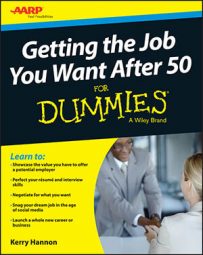Copyright © 2015 AARP. All rights reserved.
When money gets tight, your options are limited. If you’re hoping to make a career change after 50, you don’t want financial worries. You can earn more money, spend less, or do both. You may need to make some painful choices, such as downsizing or even moving to a more affordable city or town. In dire circumstances, you may even consider asking friends or family members for help or taking advantage of government-sponsored assistance programs.
Motivating yourself to get started
Spending money is much more fun than cutting expenses, but debt is a dream killer. It drives people to make choices out of desperation that often limit their opportunities to achieve future wealth. If you need additional motivation to get started, consider the following reasons to strive toward financial fitness:
When you’re nimble financially, you have more choices.
You’re more confident and less apt to appear desperate or needy.
You can focus on finding your ideal job.
You can afford to pay for the additional training and services you need to pursue your career goals.
Focusing on the fundamentals
If you never had to concern yourself with finances in the past, focus first on these fundamentals:
Chart a budget. Write down your income, what you owe, and what you have socked away. This will help you find ways to pare back your spending. Begin by keeping track of how much you spend each day and on what. Then, on a monthly basis, study your credit card, bank statements, and log of cash payments to see where your money is going and what can be trimmed back or eliminated.
Track your finances on a website, such as Mint or You Need a Budget. These free sites are designed to help you streamline your bill paying and dissect your monthly spending.
Increase your savings. If you’re unemployed, increasing your savings obviously is not an option, but if you’re still working and planning ahead for a career change or business startup, grow your nest egg. A savings cushion of six months to a year of living expenses will stave off dipping into your retirement savings or taking on debt.
Stay liquid. Emergency funds typically belong in bank accounts or money market funds that don’t fluctuate in value and are easily accessible. Consider putting some of your emergency cash in bank CDs with maturity dates of six months or less so you can eke out a little more interest than from a savings account. A great place to comparison shop is Bankrate.
Review your credit report and score. Get a free annual report and check for errors. Pay a little extra to get your credit score. Your credit score is important for two reasons:
With a higher score, you can borrow more money at lower interest rates, which gives you more choices.
Many employers are now checking credit scores prior to hiring. (They must ask your permission to do so.)
If your credit score is lower than 700, work toward improving it. Pay all bills on time, and don’t open new accounts, transfer balances, close accounts, or cancel credit cards, all of which show up on your credit report and negatively affect your credit score.
Consolidate debt. If you have several sources of debt, you may be able to consolidate loans and credit card balances into a single loan with a lower overall interest rate.
Reduce or eliminate debt. Pay down credit card balances and refinance your mortgage at a lower rate, if possible. Consider downsizing your home, depending on where you live and the real estate market. If you have enough equity built up in your current home, you may be able to sell it and pay cash for a more affordable home, eliminating your mortgage.
Contact your creditors and try to negotiate payment options. Banks are often willing to work out arrangements with people who make a sincere effort to work out a solution.
Consult with a fee-only financial planner. Look for experienced, credentialed advisers. As a rule, an adviser should have the Certified Financial Planner designation, awarded by the nonprofit Certified Financial Planner Board of Standards. These national groups of financial planners offer searchable databases with contact information: the Certified Financial Planner Board of Standards, Financial Planning Association, Garrett Planning Network, and National Association of Personal Financial Advisors.
Take a personal finance course or read a book. Many community colleges offer personal finance courses. Check out Personal Finance For Seniors For Dummies, by Eric Tyson and Robert C. Carlson (Wiley).
Tapping your financial resources
If you’re over 50, you may have built up quite a nest egg. Although you don’t want to deplete these resources, you may be able to borrow against some of them and cash out portions of others to make it through a rough patch or fund a career change or business startup. Here are a few suggestions to kick your imagination into gear:
Take out a home equity line of credit. If you have equity built up in your home, a home equity line of credit enables you to cash out that equity on an as-needed basis.
Use a home equity line of credit only as an emergency fund, perhaps to cover mortgage payments to avoid foreclosure.
Downsize. Look for a more affordable housing option. Many people who downsize enjoy the resulting increase in financial freedom and wish they had made the move sooner.
Use your assets to earn money. For example, you may be able to lease one or more rooms in your home. You can use your car or van to provide delivery services or to work as a taxi driver for a service such as UBER.
Sell your assets. You can always sell your assets, for example on eBay or craigslist, to turn them into cash.

